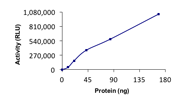
UBE2C, Active(U212-380H)
FOR BULK ORDER REQUESTS PLEASE CONTACT US
Description :Recombinant full-length human UBE2C was expressed in E. coli cells using an N-terminal His tag.
Species :Human
Tag :His tag
Expression System:E.coli
Sequence :Full length
Genbank Number :NM_007019
Specific Activity :Sample Activity Plot. For specific information on a given lot, see related technical data sheet.
Purity :Sample Purity Data. For specific information on a given lot, see related technical data sheet.
Storage, Stability, and Shipping :Store product at –70oC. For optimal storage, aliquot target into smaller quantities after centrifugation and store at recommended temperature. For most favorable performance, avoid repeated handling and multiple freeze/thaw cycles.
Applications :Ubiquitin Enzyme Assay, Western Blot
Molecular Weight :21 kDa
Gene Aliases :dJ447F3.2; UBCH10
Scientific Background :UBE2C or ubiquitin-conjugating enzyme E2C is a member of the E2 ubiquitin-conjugating enzyme family which is required for the destruction of mitotic cyclins and for cell cycle progression. UBE2C acted as a dominant-negative inhibitor which blocks the destruction of mitotic cyclins A and B and the onset of anaphase in frog embryos and mammalian cells. High UBE2C mRNA expression is associated with poor disease-free survival and overall survival. High tumor grade, as well as high Ki67 protein expression, was more frequent in the high-expression group of UBE2C.
References :
1. Mondal, S. et al: A bioluminescent assay for monitoring conjugation of ubiquitin and ubiquitin-like proteins. Anal. Biochem. 510: 41-51, 2016
2. Rape, M. et al: Autonomous regulation of the anaphase-promoting complex couples mitosis to S-phase entry. Nature 432: 588-595, 2004
3. Townsley, F. M. et al: Dominant-negative cyclin-selective ubiquitin carrier protein E2-C/UbcH10 blocks cells in metaphase. Proc. Nat. Acad. Sci. 94: 2362-2367, 1997
Product Sheets (By Lot #) :
Research Areas :Cancer, Cell Cycle, Neurobiology
